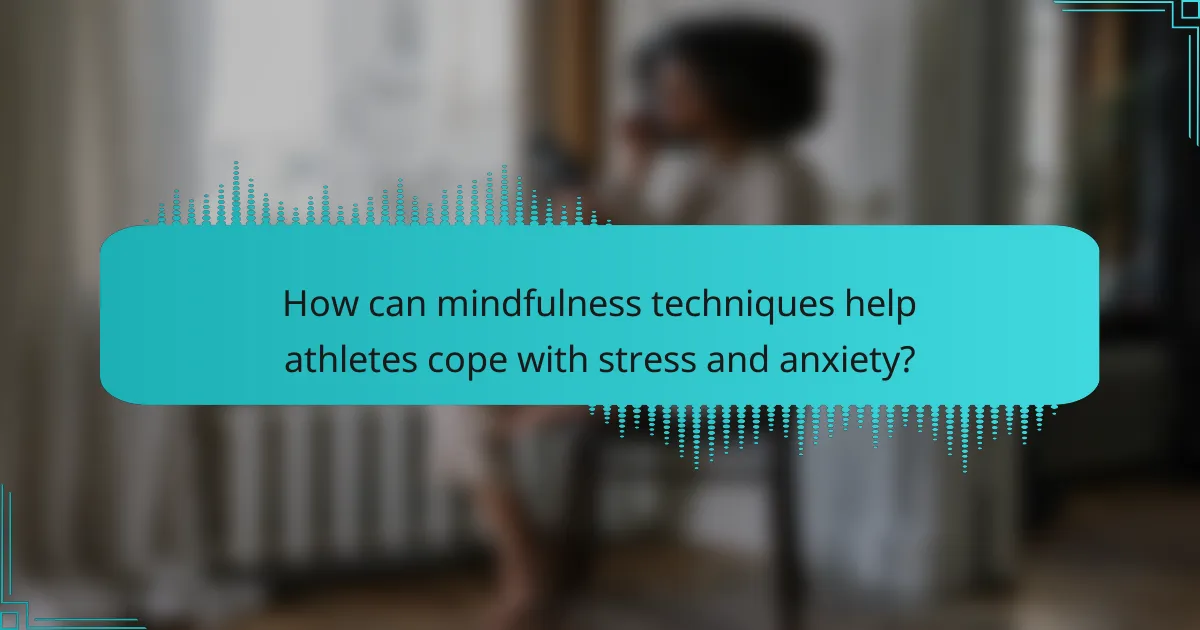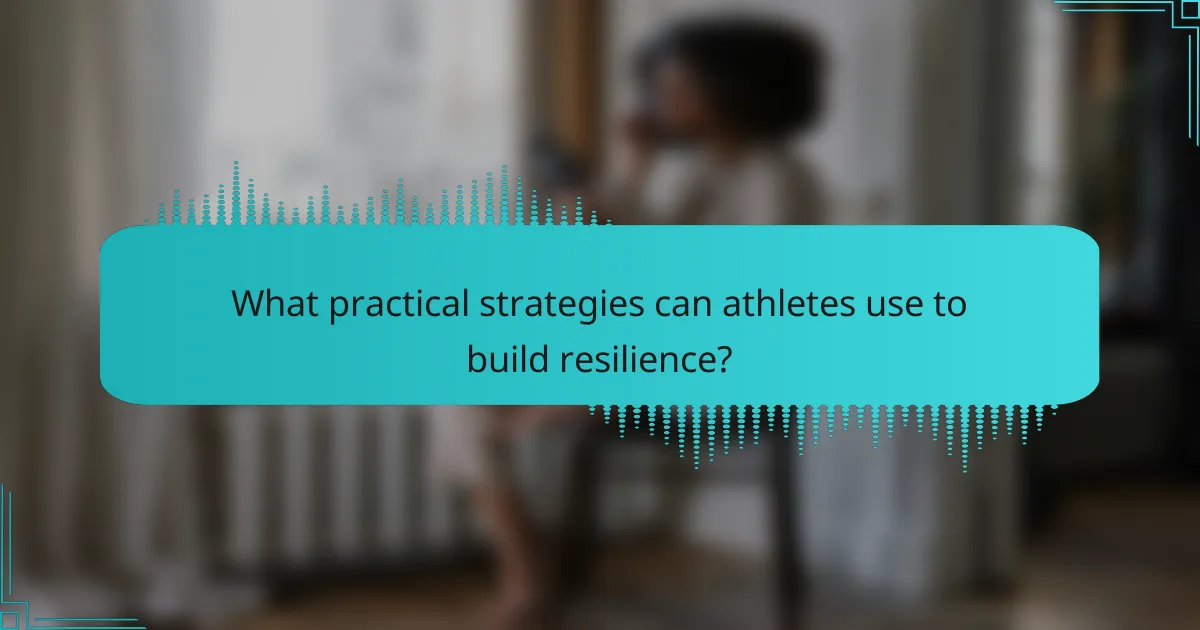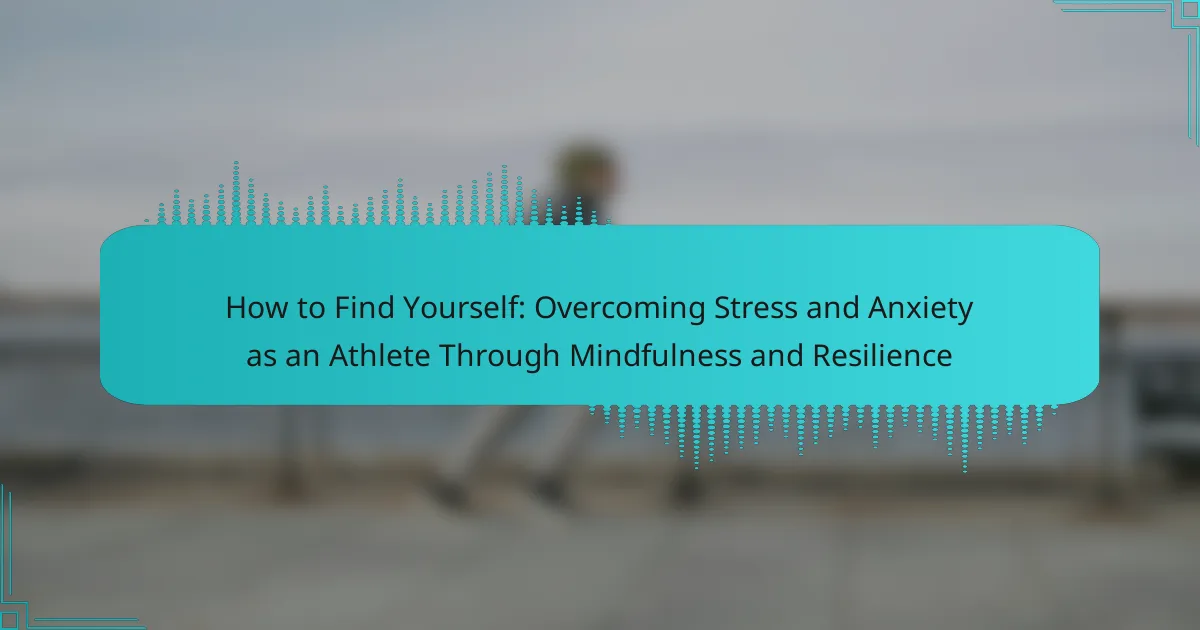Athletes often struggle with stress and anxiety, impacting their performance and well-being. Mindfulness techniques enhance mental clarity and emotional regulation, helping manage these challenges. Building resilience through adaptability and support networks is crucial for navigating competitive pressures. This article explores effective mindfulness practices, the importance of resilience, and strategies for fostering a supportive environment.

How can mindfulness techniques help athletes cope with stress and anxiety?
Mindfulness techniques help athletes manage stress and anxiety by promoting mental clarity and emotional regulation. These practices enhance focus, reduce negative thoughts, and cultivate a sense of presence. Research shows that athletes who engage in mindfulness experience lower anxiety levels and improved performance. Techniques such as meditation, breathing exercises, and visualization can significantly enhance resilience, allowing athletes to handle competitive pressures more effectively. Regular practice fosters a unique ability to stay calm under pressure, ultimately leading to better outcomes in sports.
What are the core principles of mindfulness for athletes?
Mindfulness for athletes centers on awareness, focus, and emotional regulation. Key principles include present-moment awareness, non-judgmental observation, and acceptance of thoughts and feelings. These principles enhance performance by reducing stress and anxiety. Practicing mindfulness fosters resilience, enabling athletes to cope with challenges effectively. Techniques such as meditation and breathing exercises are valuable tools for integrating mindfulness into training routines.
How can breathing exercises reduce performance anxiety?
Breathing exercises can significantly reduce performance anxiety by promoting relaxation and focus. These techniques help athletes regulate their physiological responses, lowering heart rate and cortisol levels. Practicing deep breathing improves oxygen flow, enhancing mental clarity and concentration. As a result, athletes can better manage stress and perform under pressure, fostering resilience and mindfulness.
What are effective breathing techniques for athletes?
Effective breathing techniques for athletes include diaphragmatic breathing, box breathing, and pursed lip breathing. These methods enhance oxygen intake, reduce stress, and improve focus during performance.
Diaphragmatic breathing involves deep breaths that engage the diaphragm, promoting relaxation and reducing anxiety. Box breathing consists of inhaling, holding, exhaling, and pausing for equal counts, which stabilizes heart rate and calms the mind. Pursed lip breathing slows down breathing rates, helping athletes maintain control during exertion.
Incorporating these techniques into training can significantly improve resilience and mental clarity, essential attributes for athletes facing high-pressure situations.
How does visualization enhance mental resilience?
Visualization enhances mental resilience by helping athletes manage stress and anxiety more effectively. It allows individuals to mentally rehearse performance scenarios, reducing fear and increasing confidence. Studies indicate that visualization can improve focus and emotional regulation, essential attributes for peak athletic performance. Engaging in regular visualization practices can lead to a unique attribute of enhanced self-efficacy, promoting a positive mindset during challenging situations. As a result, athletes can cultivate a greater capacity to bounce back from setbacks, ultimately fostering long-term resilience.
What steps can athletes take to implement visualization strategies?
Athletes can implement visualization strategies by following specific steps. First, they should define clear goals to visualize their desired outcomes. Next, they should create a detailed mental image of success, incorporating sensory details to enhance the experience. Practicing visualization regularly, ideally before training or competition, helps reinforce these mental images. Finally, athletes should reflect on their experiences to adjust their visualization techniques for improved effectiveness.

What unique challenges do athletes face regarding mental health?
Athletes face unique challenges regarding mental health, including performance pressure, identity issues, and social isolation. The constant demand for excellence can lead to stress and anxiety, impacting their overall well-being. Additionally, athletes often tie their self-worth to their performance, which can create a fragile mental state. As a result, developing mindfulness and resilience is crucial for managing these challenges effectively.
How can competition-related stress be managed?
Mindfulness and resilience techniques can effectively manage competition-related stress. Practicing mindfulness helps athletes stay present, reducing anxiety about performance. Techniques include focused breathing, visualization, and meditation. Resilience training builds mental toughness, enabling athletes to cope with pressure. Regularly engaging in these practices fosters a positive mindset, enhancing overall performance and well-being.
What role does social support play in an athlete’s mental wellbeing?
Social support significantly enhances an athlete’s mental wellbeing by providing emotional comfort and practical assistance. Research shows that strong social networks reduce stress and anxiety, enabling athletes to cope with competitive pressures more effectively. Supportive relationships foster resilience, which is crucial for overcoming challenges in sports. Engaging with teammates, coaches, and family creates a sense of belonging, promoting positive mental health outcomes.

What rare attributes contribute to an athlete’s resilience?
Resilience in athletes is influenced by rare attributes such as adaptability, mental flexibility, and emotional regulation. These traits enable athletes to navigate challenges effectively. Adaptability allows for quick adjustments in training and competition. Mental flexibility fosters innovative problem-solving under pressure. Emotional regulation helps manage stress and anxiety, leading to improved performance. Together, these rare attributes contribute significantly to an athlete’s overall resilience.
How does a growth mindset impact stress management?
A growth mindset enhances stress management by fostering resilience and adaptability. Athletes with a growth mindset view challenges as opportunities for growth, reducing anxiety. This perspective allows them to embrace setbacks, learn from experiences, and maintain focus under pressure. Research indicates that individuals with a growth mindset report lower levels of stress and higher performance levels. By cultivating this mindset, athletes can better navigate the pressures of competition and training, leading to improved mental health and overall well-being.
What are the benefits of journaling for athletes?
Journaling offers athletes significant benefits, including enhanced self-awareness, stress reduction, and improved focus. By reflecting on experiences, athletes can identify emotions and triggers, fostering mindfulness. This practice promotes resilience by allowing athletes to process challenges and setbacks, ultimately leading to better performance and mental well-being. Regular journaling can also serve as a unique tool for tracking progress and setting goals, reinforcing a positive mindset.
What should athletes include in their journaling practice?
Athletes should include self-reflection, goal-setting, emotional tracking, and performance analysis in their journaling practice. These elements enhance mindfulness and resilience, helping athletes manage stress and anxiety.
Self-reflection allows athletes to process experiences, while goal-setting provides clear objectives. Emotional tracking helps in understanding feelings during training and competition, promoting mental clarity. Performance analysis enables athletes to identify strengths and areas for improvement, fostering a growth mindset.

What practical strategies can athletes use to build resilience?
Athletes can build resilience by practicing mindfulness techniques, setting realistic goals, and fostering a strong support network. Mindfulness helps athletes stay present, reducing stress and anxiety. Techniques such as meditation and breath control enhance focus and emotional regulation. Setting achievable goals provides a sense of accomplishment, reinforcing motivation. Additionally, a supportive network of coaches, teammates, and mental health professionals offers encouragement and perspective during challenging times. These strategies collectively contribute to developing a resilient mindset essential for athletic performance.
How can setting realistic goals reduce anxiety?
Setting realistic goals can significantly reduce anxiety by providing clear direction and manageable expectations. When athletes set achievable objectives, they experience less pressure and uncertainty, leading to improved focus and performance. This approach fosters resilience, allowing them to navigate challenges with confidence. Studies show that goal-setting enhances motivation, which can further alleviate anxiety by creating a sense of purpose and accomplishment.
What are common mistakes athletes make when dealing with stress?
Athletes often make mistakes like ignoring their emotions, neglecting recovery, and relying solely on physical training. These errors can exacerbate stress and hinder performance.
Ignoring emotions leads to unaddressed stress, while neglecting recovery can result in burnout. Relying only on physical training overlooks the importance of mental resilience.
As a result, athletes should adopt mindfulness practices to recognize their emotional states and integrate recovery strategies to maintain balance.
What expert tips can enhance an athlete’s coping strategies?
Athletes can enhance their coping strategies through mindfulness practices and building resilience. Techniques such as deep breathing, visualization, and meditation help manage stress and anxiety effectively. Regularly engaging in these practices fosters a positive mindset and improves focus during competition. Additionally, setting realistic goals and maintaining a supportive social network play crucial roles in enhancing emotional resilience. These strategies empower athletes to navigate challenges and maintain peak performance.


